A Coach's Role: The Complete Guide to Transformative Sports Leadership

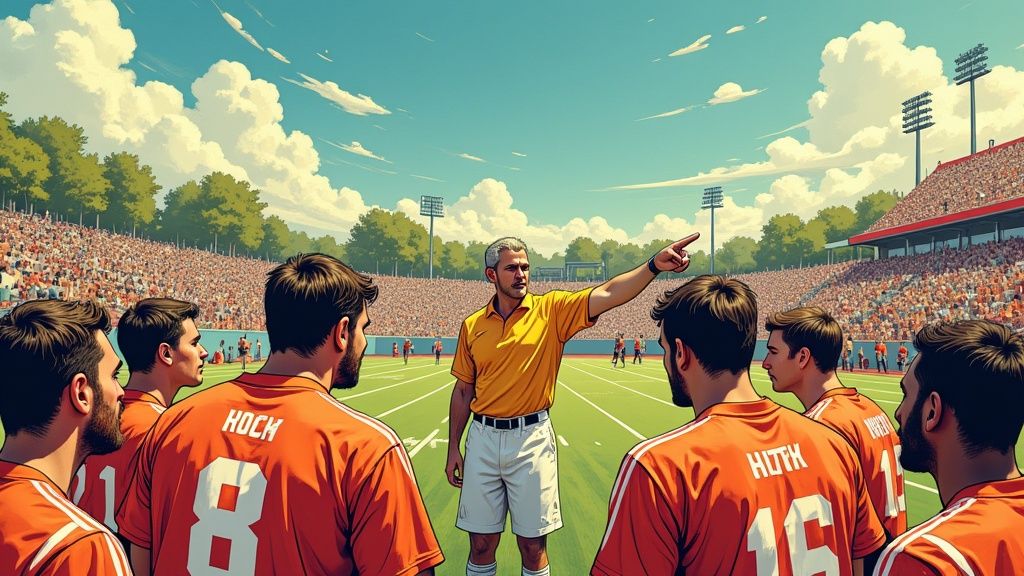
The Evolution of Modern Sports Leadership
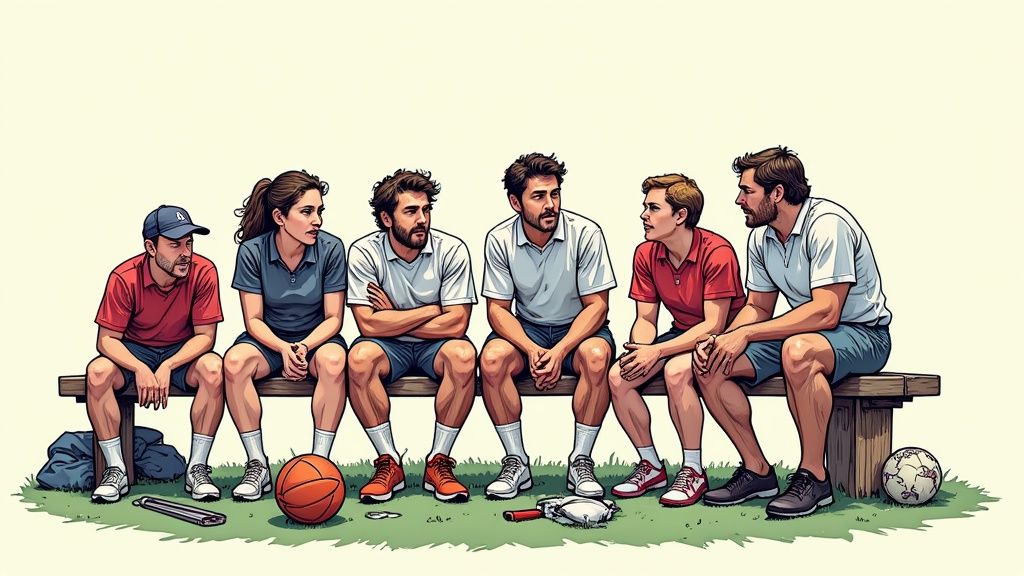
Sports coaching has changed dramatically in recent years. While technical knowledge remains important, successful coaches now take on multiple roles - acting as mentors, teachers, and trusted advisors. This shift reflects what today's athletes need to perform at their best, going far beyond just learning game tactics.
From Command and Control to Holistic Development
The old-school authoritarian coaching style is being replaced by methods focused on developing the whole athlete. Modern coaching recognizes that peak performance comes from more than just physical training - mental toughness, emotional wellbeing, and personal growth are equally crucial. This approach allows coaches to understand and support each athlete's unique needs, creating training plans that work for them as individuals.
Balancing Technical Expertise and Emotional Intelligence
Today's coaches need both strategic knowledge and people skills. While understanding game tactics remains essential, building strong relationships with athletes is just as important. Great coaches create an environment where athletes feel safe expressing themselves and communicating openly. They excel at reading emotional cues, giving constructive feedback, and fostering team unity based on mutual trust.
Adapting to the Needs of Modern Athletes
The growing demand for quality coaching reflects these changes. Recent data shows significant growth in the UK coaching industry - there were 108,800 sports coaches, instructors and officials in Q3 2024, up from 103,500 the previous quarter. For more details, see the latest coaching statistics. To meet athletes' diverse needs, coaches must stay current with training techniques, sports psychology, and athlete development methods.
Building Sustainable and Successful Programs
Modern coaching goes beyond just winning games. The focus is on creating lasting programs that support both athletic achievement and personal development. This means using proven training methods, maintaining high standards, and providing ongoing mentorship. By taking this broader view, coaches help athletes succeed in their sport while building valuable life skills they can use anywhere. The result is a more meaningful experience for everyone involved.
Creating Inclusive Excellence in Coaching
Today's successful coaches do more than develop athletic skills. A key part of coaching focuses on creating environments where all athletes can thrive. This means building training spaces where every participant feels welcomed, valued and able to reach their full potential.
Building a Culture of Belonging
Athletes bring unique backgrounds, experiences and perspectives to any team. As a coach, your role is to ensure each person feels supported and included, regardless of their identity or background. When athletes feel psychologically safe and trusted, they perform better and contribute more fully to the team's success.
Practical Strategies for Inclusion
Here are key ways coaches can create more inclusive environments:
- Establish mentorship programs connecting experienced athletes with newcomers from underrepresented groups
- Build strong support networks where athletes can connect, share experiences, and develop relationships
- Address systemic barriers by reviewing selection processes, resource access, and performance opportunities
- Foster open communication channels for athletes to provide feedback
- Create clear team values centered on respect and inclusion
Measuring Progress and Impact
Just as coaches track athletic performance metrics, it's important to measure inclusion efforts. Regular feedback through surveys and conversations helps identify what's working and where improvements are needed. This data-driven approach demonstrates the real impact of inclusion initiatives.
Recent statistics highlight ongoing challenges, particularly around gender equity in coaching. According to UK Coaching research, the percentage of female coaches dropped from 44% in 2022 to 38% in 2024. Learn more about these findings on the Sport in Herts website.
By actively promoting diversity and inclusion both on and off the field, coaches create environments where athletes can develop their full potential. Through consistent effort and commitment to inclusive practices, the entire team benefits from broader perspectives and stronger connections.
Building Lasting Community Impact Through Sport
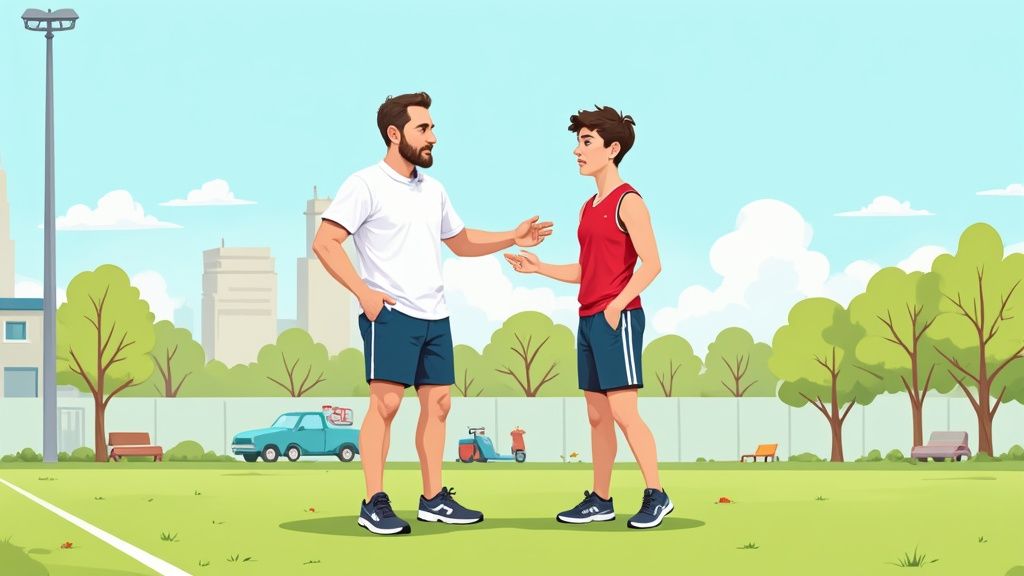
Today's coaches do much more than teach athletic skills - they shape communities and change lives. Their work extends beyond the field to address important social needs and build stronger neighborhood connections. Let's explore how coaches can use their unique position to create meaningful change.
Making a Difference Through Sport
Coaches build special bonds with young people that create opportunities for positive influence. Through these relationships, they can guide youth development, promote good values, and encourage community service. Simple activities like organizing team volunteer days at food banks or fundraising for local projects help athletes learn responsibility while benefiting others.
Working With Community Partners
Success requires joining forces with others who share similar goals. By teaming up with local organizations, schools and businesses, coaches gain access to more resources and can reach more people. This could mean partnering with charities to run sports programs for kids in need or working with businesses to sponsor community events. These partnerships strengthen the ties between sports and community life.
In regional areas like Queensland, volunteer rugby coaches play an essential role in providing organized sports opportunities that promote community health and connection. Despite facing various challenges, these coaches make vital contributions to their communities' wellbeing. Learn more about their impact in this research paper on regional rugby coaches.
Building Programs That Last
Creating long-term community programs takes careful planning and ongoing support. Coaches need to:
- Identify specific community needs
- Design programs that address those needs
- Find resources to keep programs running
- Get community members involved
This could include starting youth mentoring programs, regular community sports events, or service projects. The key is making sure these efforts can continue helping people year after year.
Tracking Success and Impact
It's important to measure how community programs make a difference. This means gathering data on:
- Number of participants
- Feedback from community members
- Volunteer participation
- Funds raised
- Changes in community attitudes
This information helps show the value of these programs, attract funding and partners, and improve future efforts. When coaches embrace their role as community leaders, they create positive changes that benefit everyone involved in sports programs.
Mastering Performance Development Strategies
A great coach builds success through proven methods that consistently deliver results. The role requires expert knowledge of training principles combined with leadership skills to help athletes and teams reach their potential.
Periodization: Planning for Peak Performance
Periodization is fundamental to athletic development. This involves carefully planning training phases throughout the year to maximize gains while preventing burnout. For instance, coaches emphasize building strength in the off-season before shifting focus to speed and agility as competitions approach. This systematic approach helps athletes perform their best when it matters most.
Skill Development: Honing Athletic Abilities
Coaches must excel at developing athletes' technical skills. This means carefully assessing each athlete's capabilities and creating targeted improvement plans. A coach might design specific drills to boost a basketball player's shooting accuracy or refine a swimmer's technique. This focused training accelerates athletic development.
Performance Analytics: Measuring and Tracking Progress
Modern coaching relies heavily on performance analytics. By tracking key metrics like speed, strength, and endurance, coaches can measure progress and identify areas needing work. This data helps coaches adjust training plans based on actual results. Analytics also help spot potential injury risks early, allowing preventive action.
Balancing Technical Instruction With Mental Conditioning
While physical training is critical, mental preparation is equally important. Good coaches incorporate techniques like mindfulness, visualization, and goal setting into their programs. These tools help athletes handle pressure and maintain focus during competition. The best coaches create a positive environment that supports both physical and mental growth, leading to well-rounded athletes who perform consistently and reach their full potential.
Cultivating Successful Coach-Athlete Relationships
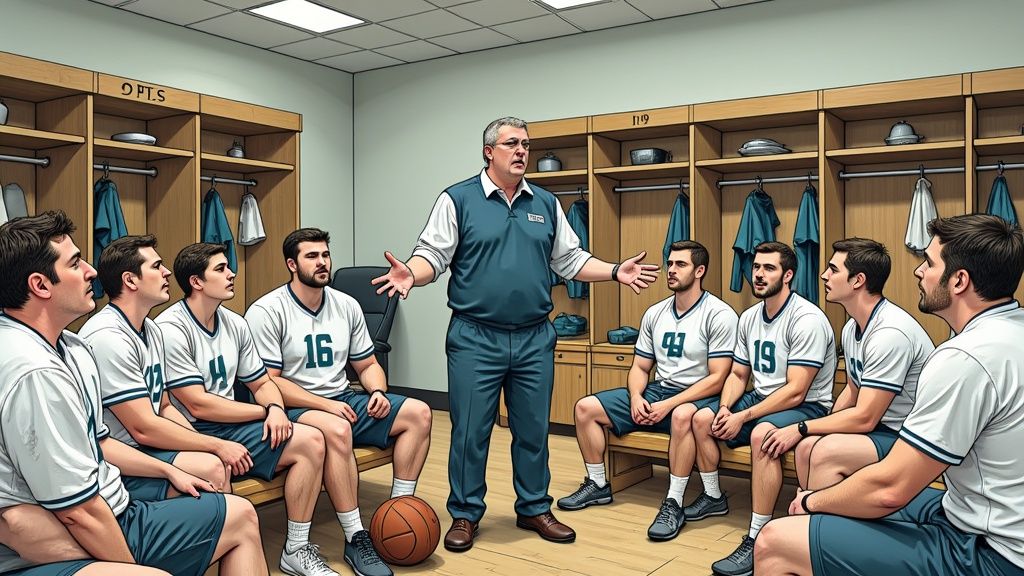
A coach does more than teach skills and strategy. Their most important role is building strong, meaningful bonds with athletes while keeping professional boundaries. Let's explore how successful coaches develop these vital relationships to create an environment where athletes can excel.
Matching Leadership Style to Athletes' Needs
Great coaches know there's no single approach that works for everyone. They carefully adjust their leadership style based on each athlete's personality, age, and skill level. For example, younger athletes often need more guidance and encouragement, while experienced athletes benefit from a collaborative approach focused on refinement and strategy.
Smart Motivation Strategies
Research shows that internal motivation - driven by personal growth and enjoyment - creates better long-term results than external rewards or pressure. Smart coaches create training environments that challenge athletes while giving them ownership of their progress. They help athletes set meaningful goals and celebrate small wins along the way.
Managing Team Dynamics
Every team faces disagreements at times. The coach's skill in handling these situations makes all the difference. Effective coaches help athletes communicate openly, find shared solutions, and turn conflicts into opportunities for growth. When team members trust and support each other, they're far more likely to succeed together.
Creating Trust Through Actions
Trust forms the core of strong coach-athlete relationships. Coaches build trust by being reliable, consistent, and showing genuine care for their athletes as people, not just performers. They maintain clear boundaries and confidentiality, creating a safe space where athletes feel comfortable sharing concerns and working through challenges.
Navigating Tough Moments
Coaches regularly face difficult situations - from performance slumps to team conflicts. Success requires both leadership skills and emotional intelligence. Rather than avoiding problems, effective coaches address issues directly while staying positive and solution-focused. For example, after a tough loss, they help the team analyze what happened objectively and identify specific ways to improve rather than dwelling on mistakes.
Preparing for the Future of Coaching Excellence
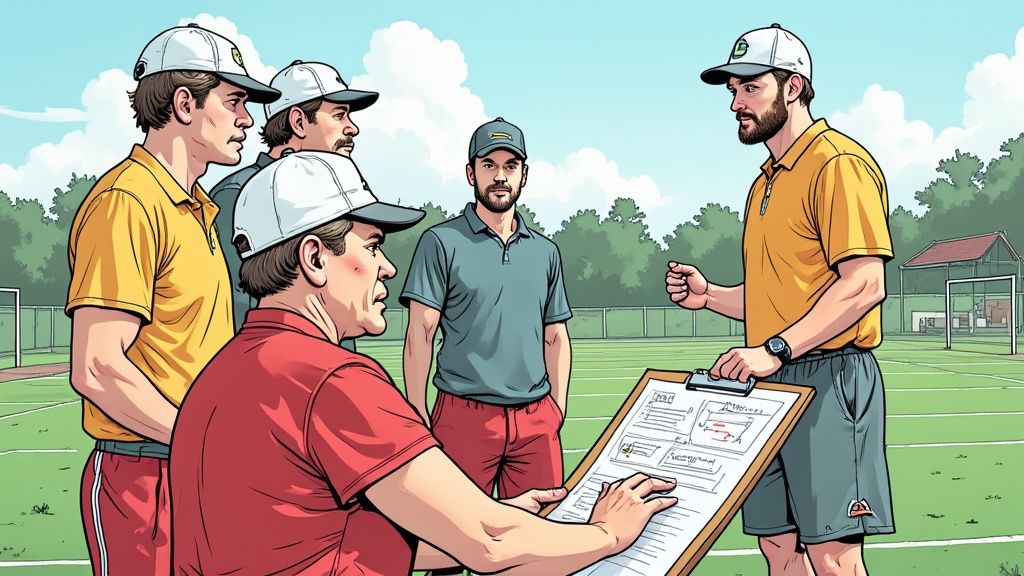
The role of a coach is constantly evolving as sports continue to advance. Success in coaching requires embracing proven training techniques, adopting useful tools, and adapting to meet athletes' changing needs. This means proactively seeking opportunities to learn and grow.
Integrating Technology and Analytics
Modern coaching benefits greatly from technological tools. Coaches can now use wearable devices to track real-time performance data and video analysis software to evaluate technique in detail. Data analytics helps identify key patterns and trends to optimize training and game strategy. Understanding how to effectively use these tools has become an essential coaching skill.
Embracing Modern Training Methodologies
Successful coaches regularly evaluate and incorporate evidence-based training methods. They stay current with sports science research and proven approaches to strength, conditioning and skill development. A deep understanding of periodization allows coaches to design programs that build peak performance while preventing burnout. For instance, coaches might add specific plyometric exercises based on the latest power development research.
Professional Development and Advancement
Ongoing education is vital for coaching excellence. This includes earning advanced certifications, joining coaching communities, and learning from experienced mentors. Regular professional development helps coaches sharpen their abilities and stay updated on industry best practices. The guidance of mentor coaches provides valuable perspective for handling everyday challenges.
Adapting to Changing Athlete Needs
Effective coaching goes beyond just teaching skills - it requires understanding athletes as whole people. Athletes today face mounting pressures that affect their mental and emotional wellbeing. Coaches need strong communication skills and must create supportive team environments. This might involve incorporating mindfulness practices or working with sports psychologists to help athletes manage stress and anxiety. By addressing athletes' full range of needs, coaches can better support their success.
Looking to grow as a coach? Visit Coaching Hub for resources, insights and community support to help develop your coaching skills.